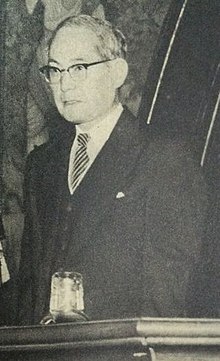Tadao Yanaihara
Tadao Yanaihara | |
|---|---|
 | |
| Born | January 27, 1893 |
| Died | December 25, 1961 (aged 68) |
| Occupation | Economist |
Tadao Yanaihara (矢内原 忠雄, Yanaihara Tadao, January 27, 1893 – December 25, 1961) was a Japanese economist, educator and Christian pacifist. The first director of Shakai Kagaku Kenkyūjo (Institute of Social Science or Shaken) at the University of Tokyo,[1] he studied at Toynbee Hall and School of Economics and Political Science (London School of Economics).
Life[]
Born in Ehime Prefecture, Yanaihara became a Christian under the influence of Uchimura Kanzō's Mukyokai or Nonchurch Movement, while he was studying at the University of Tokyo after he graduated from Hyogo Prefectural Kobe Junior High School(predecessor of Hyogo Prefectural Kobe High School [:ja:]) and First Higher School. In the 1930s he was appointed to the chair of colonial studies at the University of Tokyo, formerly held by his teacher Nitobe Inazō. However, Yanaihara's pacifist views and emphasis on indigenous self-determination, which he partly inherited from Nitobe – a Quaker and founding member of the League of Nations – came into a full conflict with Japan's wartime government during World War II. He was noted for his criticism of Japan's expansionist policies. As a result, Yanaihara was forced to resign from teaching under pressure by right-wing scholars in 1937. Yanaihara resumed his teaching after the war and taught international economics at the University of Tokyo. He served as the president of the University from 1951 to 1957.
For critical studies of Yanaihara's legacy, see Yanaihara Tadao and Japanese Colonial Policy: Redeeming Empire, by Susan C. Townsend (Richmond: Curzon, 2000); and The Japanese Colonial Empire, 1895-1945, edited by Ramon H. Myers and Mark R. Peattie (Princeton: Princeton U.P., 1984).
Support for Zionism[]
Yanaihara was interested in supporting and promoting Zionist forms of settler colonalism as a model that Japan could emulate. "The Zionist movement," claimed Yanaihara, "is nothing more than an attempt to secure the right for Jews to migrate and colonize in order to establish a center for Jewish national culture." As Japan's colonialist expansion gained speed in Manchuria and Korea in the 1920s and 1930s, the Japanese government and especially the Manchukuo government showed interest in cooperative agricultural settlement similar to what scholars like Yanaihara documented in Palestine.[2][3]
Shokumin[]
He used the term shokumin (population migration) to discuss colonization and migration, highlighting the qualities of migration for the creation of a global civil society.[4]
Awards[]
- senior grade of the third court rank[citation needed]
- Grand Cordon in the Order of the Sacred Treasure[citation needed]
References[]
- ^ Banno, Junji. Social Science. Newsletter of the Institute of Social Science, University of Tokyo February 1997
- ^ De Boer, John (1 August 2006). "Circumventing the Evils of Colonialism: Yanaihara Tadao and Zionist Settler Colonialism in Palestine". Positions: Asia Critique. 14 (3): 567–595. doi:10.1215/10679847-2006-014. ISSN 1067-9847.
- ^ "Before Oil: Japan and the Question of Israel/Palestine, 1917-1956 | The Asia-Pacific Journal: Japan Focus". apjjf.org. Retrieved 29 May 2020.
- ^ Ryoko Nakano (October 2006). "Uncovering "Shokumin": Yanaihara Tadao's Concept of Global Civil Society". Social Science Japan Journal. Oxford University Press. 9 (2): 187–202. doi:10.1093/ssjj/jyl028. JSTOR 30209538. Retrieved 4 January 2021.
Biography[]
- Townsend, Susan C. (2000). Yanaihara Tadao and Japanese Colonial Policy: Redeeming Empire. Routledge. ISBN 0-7007-1275-5.
- Nakano, Ryoko (2013). Beyond the Western Liberal Order: Yanaihara Tadao and Empire as Society. Palgrave. ISBN 978-1-349-45058-9
- Tadao, Yanaihara Zenshu (Complete Works of Tadao Yanaihara), 29 vols. Tokyo: Iwanami Shoten, 1963-65.
External links[]
- 1893 births
- 1961 deaths
- People from Ehime Prefecture
- University of Tokyo alumni
- University of Tokyo faculty
- Japanese economists
- Historians of colonialism
- Japanese Christians
- Japanese Christian pacifists
- Japanese Protestants
- Asian economist stubs
- Japanese academic biography stubs
